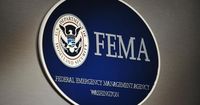Federal Emergency Management Agency (FEMA) staff were left stunned and confused on Monday, June 2, 2025, when their new acting administrator, David Richardson, reportedly said he did not know the United States has a hurricane season. This startling comment came just one day after the official start of the 2025 hurricane season, which runs from June through November. The remark, made during a daily operational briefing attended by hundreds of FEMA employees and interagency partners, has sparked widespread concern about the agency’s preparedness and leadership as it faces an above-normal storm season.
According to multiple sources familiar with the briefing, Richardson’s comment left many staffers baffled, unsure if the statement was a literal admission, a poorly timed joke, or made in some other context. Reuters, which first reported the story, cited four insiders who described the reaction within FEMA as one of disbelief and alarm. Three other sources told CBS News that the comment flustered employees who feared their leader’s apparent unfamiliarity with an essential aspect of FEMA’s mission.
The National Oceanic and Atmospheric Administration (NOAA) had just released forecasts predicting an active hurricane season, with up to 10 hurricanes expected to batter the U.S. coastline this year. NOAA further warned that the 2025 season could bring 13 to 19 named storms, six to 10 of which may become hurricanes, and three to five potentially major hurricanes. Yet, despite these warnings, the agency’s top official seemed unaware of the season’s significance, raising eyebrows among staff already grappling with low morale and operational challenges.
Adding to the unease, Richardson also announced during the briefing that FEMA would not be issuing a new disaster response plan this year. This was a reversal from his earlier statements in May, when he had promised staff a new plan—including tabletop exercises—would be ready for review by May 23. He explained that he did not want to make changes that might conflict with the FEMA Review Council, a body established under former President Donald Trump to oversee the agency’s operations. The council includes Department of Homeland Security (DHS) Secretary Kristi Noem and several governors.
FEMA employees have been navigating a period of significant upheaval. Since January 2025, when the Trump administration took office, about 2,000 full-time FEMA staff—roughly one-third of the agency’s workforce—have either been terminated or resigned. Hurricane preparation efforts have been scaled back dramatically, with training workshops and travel for state and local emergency managers curtailed due to restrictions imposed on staff. This has left many worried about the agency’s capacity to respond effectively to disasters.
Despite these cuts, DHS Secretary Kristi Noem approved Richardson’s request in May to retain more than 2,600 short-term disaster response and recovery employees, who now make up about 40% of FEMA’s workforce. These short-term staff form the backbone of FEMA’s on-the-ground response efforts, making their retention crucial amid the agency’s ongoing transformation.
Richardson himself is a former Marine artillery officer and previously served as the assistant secretary at DHS’s office for countering weapons of mass destruction, a role he reportedly continues to hold alongside his FEMA responsibilities. He was appointed FEMA’s acting administrator in early May after the abrupt firing of his predecessor, Cameron Hamilton. Hamilton’s departure followed clashes with the Trump administration over FEMA’s future, with Trump allies reportedly unhappy with Hamilton’s perceived slow pace in restructuring the agency. Trump has publicly suggested that FEMA should be downsized or even eliminated, advocating for states to assume more responsibility for disaster response.
The DHS spokesperson later sought to downplay Richardson’s controversial remark, describing it as a joke and affirming FEMA’s readiness for the hurricane season. The spokesperson said, “Despite meanspirited attempts to falsely frame a joke as policy, there is no uncertainty about what FEMA will be doing this Hurricane Season. FEMA is laser focused on disaster response, and protecting the American people.” They added that under Secretary Noem and Richardson, “FEMA is shifting from bloated, DC-centric dead weight to a lean, deployable disaster force that empowers state actors to provide relief for their citizens.”
Nonetheless, the comment has reignited concerns about Richardson’s lack of disaster response experience and his grasp of FEMA’s core mission. Sources told Reuters and other outlets that the remark spread quickly among staff, exacerbating fears about leadership during a critical period. The back-and-forth on the disaster plan update and a lack of clear strategic guidance have further contributed to confusion and low morale within the agency.
Hurricanes have long been a deadly and costly threat to the United States, causing dozens of deaths and hundreds of millions of dollars in damages annually. Climate change has intensified these storms, making preparedness and swift response more crucial than ever. FEMA’s role in coordinating federal assistance and supporting state and local agencies is vital, especially during an active hurricane season.
Yet, with the agency facing deep staffing cuts, diminished training, and leadership questions, many emergency management professionals worry about its ability to meet the challenge. The agency’s current trajectory, marked by Richardson’s surprising comments and policy reversals, raises urgent questions about how FEMA plans to safeguard communities in the months ahead.
As the 2025 hurricane season unfolds, all eyes will be on FEMA and its leadership. Will the agency rise to the occasion despite internal turmoil, or will its struggles undermine the nation’s disaster response capabilities? For now, staff remain unsettled, hoping that the storms ahead do not expose the cracks in FEMA’s readiness.





